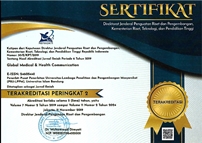Efek Konsumsi Air Kelapa (Cocos nucifera) terhadap Ketahanan Berolahraga Selama Latihan Lari pada Laki-laki Dewasa Bukan Atlet
Abstract
Ketahanan berolahraga menunjang latihan fisik yang optimal untuk meningkatkan derajat kesehatan dan kebugaran jasmani. Penurunan kapasitas ketahanan olahraga disebabkan oleh dehidrasi dan penurunan karbohidrat dalam otot selama melakukan latihan. Air kelapa berpotensi sebagai minuman olahraga karena memiliki derajat keasaman yang rendah, gula seimbang, kandungan mineral, dan bersifat isotonis. Penelitian ini bertujuan mengetahui efek konsumsi air kelapa terhadap ketahanan dan kebugaran berolahraga diukur dari jarak tempuh dan VO2max selama latihan lari. Penelitian dilakukan di Lapangan FPOK UPI Bandung periode Juli 2015–Februari 2016. Bahan penelitian yang digunakan adalah air kelapa dalam kemasan. Air mineral, air gula 5%, dan minuman olahraga isotonik yang digunakan sebagai pembanding. Subjek penelitian adalah 120 orang laki-laki, berusia 18–23 tahun yang dibagi menjadi 4 kelompok untuk tiap-tiap bahan uji. Setelah pemanasan, subjek berlari secepatnya selama 30 menit. Bahan uji diberikan sebelum dan setiap 10 menit selama lari. Jarak yang ditempuh dicatat dalam satuan meter. Analisis dengan one-way ANOVA yang dilanjutkan dengan uji least significant difference (LSD) dengan α<0,05. Jarak tempuh terpanjang rata-rata dan VO2max tertinggi didapatkan pada kelompok perlakuan air kelapa, diikuti kelompok air gula 5%, minuman olahraga isotonik, dan air mineral (p<0,01). Simpulan, konsumsi air kelapa sebelum dan selama latihan olahraga lari dapat meningkatkan ketahanan olahraga pada laki-laki dewasa bukan atlet.
THE EFFECTS OF COCONUT WATER (COCOS NUCIFERA) CONSUMPTION TOWARDS ENDURANCE DURING RUNNING EXERCISE ON NON-ATHLETE ADULT MALE
The endurance in exercising supports optimal physical training to improve physical health and fitness. Two major factors in decreasing sport endurance are dehydration and loss of carbohydrates in muscle during exercise. Coconut water is a potential sports drink because it has low acidity, sugars, minerals content and is isotonic. This research aims to know the effects of coconut water consumption towards endurance and fitness measured from VO2max and mileage during running exercise. The study was conducted in FPOK UPI Bandung during July 2015 to February 2016. Research material used was coconut water, mineral water, 5% sugar water, and isotonic sports drink. The subjects were 120 men, aged 18–23 years old, divided into 4 groups for each of the test material. After warming up, the subjects ran quickly for 30 minutes. Test materials were given before and every 10 minutes during the run. Distance traveled was recorded in units of meters. Data was analyzed using one-way ANOVA test followed by the least significant difference (LSD) test with α<0.05. The longest distance and highest VO2max were obtained by the group treated with coconut water, followed by 5% sugar water, isotonic sports drinks, and mineral waters (p<0.01). In conclusion, coconut water consumption before and during exercise can improve sports endurance on non-athlete adult male.
Keywords
Full Text:
PDF (Bahasa Indonesia)References
Kemenkes RI. Pembinaan kesehatan olahraga di Indonesia. Jakarta: Info Datin, Pusat Data dan Informasi Kementerian Kesehatan RI; 2015.
Von Duvillard SP, Braun WA, Markofski M, Beneke R, Leithäuser R. Fluids and hydration in prolonged endurance performance. Nutrition. 2004;20(7–8):651–6.
Ronald H. Metoda rehidrasi USATF sebagai metode alternatif pemulihan cairan tubuh. Seminar Nasional 2: Revitalisasi Penjas Melalui Pembenahan Citra Paradigmatis, Esensi Filosofis serta Struktur Kelembagaan. Bandung, 21–22 Desember 2009 [diunduh 21 Mei 2016]. Tersedia dari: http://tinyurl.com/ronald-seminar-upi.
Kalman DS, Feldman S, Krieger DR, Bloomer RJ. Comparison of coconut water and carbohydrate-electrolyte sport drink on measures of hydration and physical performance in exercise-trained men. J Int Soc Sports Nutr. 2012;9:1.
Yong JW, Ge L, Ng YF, Tan SN. The chemical composition and biological properties of coconut (Cocos nucifera L.) water. Molecules. 2009;14(12):5144–64.
Reddy EP, Lakshmi TM. Coconut water-properties, uses, nutritional benefits in health and wealth and in health and disease: a review. JCTMB. 2014;2(2):6–18.
da Silva SC, Monteiro WD, Farinatti PTV. Exercise maximum capacity assessment: a review on the traditional protocols and the evolution to individualized models. Rev Bras Med Esporte. 2011;17(5):363–9.
Aragón-Vargas LF, Madriz-Dávila K. Incomplete warm-climate, post-exercise rehydration with water, coconut water or a sports drink. Med Sci Sports Exerc. 2000: 32(5):S238.
Saat M, Singh R, Sirisinghe RG, Nawawi M. Rehydration after exercise with fresh young coconut water, carbohydrate-electrolyte beverage and plain water. J Physiol Anthropol Appl Human Sci. 2002;21(2):93–104.
Ismail I, Singh R, Sirisinghe RG. Rehydration with sodium enriched coconut water after exercise-induced dehydration. Southeast Asian J Trop Med Public Health. 2007;38(4):769–85.
Laitano O, Trangmar SJ, Marins DM, Menezes ES, da Silva RG. Improved exercise capacity in the heat followed by coconut water consumption. Motriz Rev Educ Fis. 2014;20(1):107–11.
Bonetti DL, Hopkins WG. Effects of hypotonic and isotonic sports drinks on endurance performance and physiology. Sport Sci. 2010; 14:63–70.
DOI: https://doi.org/10.29313/gmhc.v5i1.1966
pISSN 2301-9123 | eISSN 2460-5441
Visitor since 19 October 2016:
Global Medical and Health Communication is licensed under a Creative Commons Attribution-NonCommercial-ShareAlike 4.0 International License.






























.png)
_(1).png)
_(1).jpg)
